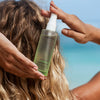It's time to give your skin a pep talk: let's harness these molecules to create a healthy, glowing complexion.
When it comes to taking care of our skin, sifting through enticing skincare technologies, ingredients, and product duos is enough to overwhelm even the most avid skincare aficionado. Although each beauty buzzword comes with lofty promises, peptides are a perfect combination of nature and science, making it a healthy skin tonic we can rely on.
A definitive main character in healthy ageing, peptides are short chains of amino acids which are responsible for telling your cells to make more collagen, making them a gold standard active ingredient for skincare products. By applying them topically, you're essentially telling your body it needs to up its collagen game. Clever, huh? But before we skip to the good part, we asked facialist and skincare expert Debbie Thomas to weigh in.
What is a peptide?
“Peptides are naturally occurring short chain amino acids that form the building blocks of protein structures such as collagen and elastin” Thomas explains. “Collagen and elastin form the foundation of your skin, they're responsible for the texture, strength and resilience of our complexions.” Although there are hundreds of different types of peptides in our body, there are four main categories in skincare – signal peptides (which tell the body to increase the production of collagen), carrier peptides (which aid healing and ‘carry’ essential trace minerals into the skin to boost collagen production), enzyme inhibitor peptides (which reduce the degradation of collagen) and neurotransmitter peptides (which smooth fine lines on the skin). While they all sound promising, experts believe that the most dependable formulas contain signal and/or carrier peptides.
Synthetic peptides may have been the go-to in formulas in the past, but plant peptides are paving the way in new technology. Research has found that protein-derived peptides such as soy, rice and cotton pearl are a great way to include peptides into your skincare without the need for artificial ingredients. Scientists have worked hard to develop a form of soluble collagen through a fermentation process using yeast, as well as extracting proteins from quinoa and discovering that pea protein has the capacity to stimulate the main dermal proteins affected by skin ageing. It can even be found in our garden – as lupins are a plant rich in amino acids (in particular glutamine, which has the ability to increase cellular growth) – and works as an enzyme inhibitor to prevent collagen and elastin damage, showing that once again, nature always prevails.

Why do we need them?
Similarly to hyaluronic acid, we naturally produce less peptides as we age, leading to a less firm visage as well as dull, dehydrated skin. “When our body stops producing as much collagen we tend to see fine lines and wrinkles developing, textural changes and a compromised barrier function (which leads to sensitivity and dryness),” Thomas says. “However, when applied topically in skincare products such as creams or natural serums, peptides act as messengers, signalling skin cells to perform specific functions. There are many forms of peptides and they do perform different functions so you do need to ensure your product has the right blend to support your skin concerns.”
What are the benefits of adding them into our skincare regime?
A recent study in the International Journal of Molecular Sciences revealed that using peptides in our skincare routine can significantly improve the texture and appearance of our complexion. Not only can it soften lines and tighten loose skin, it can also repair the skin barrier, improve elasticity and clarity and smooth texture. “It's true that extensive scientific research has proven that topically applied peptide products can support your skin on many levels,” Thomas explains. “However, don't expect overnight changes, it takes months of regular use to see the benefits of peptide use and if you have generally good skin, you many see little change but will be improving your long-term skin health. Think prevention and slowing down the signs of ageing like dehydration and sensitivity, rather than thinking of a peptide product as an overnight miracle worker.”
How do we use them?
The good news is that we don't need to add yet another step in our daily skincare regime as peptides can easily be added to existing products or can be found in a single formula. “Peptides are more commonly found in serums, which should be applied after cleansing and before applying moisturiser or SPF,” Thomas says. “They can also be used alongside all other ingredients as they don't tend to cause any irritation or conflict, however always follow the directions of the specific product you're using. They work particularly well with antioxidants, retinols and ceramides for a total skin health boost.”

 Skincare
Skincare
 Gifts
Gifts

 Bestsellers
Bestsellers
 Makeup
Makeup
 Body Care
Body Care
 Men's
Men's
 Hair Care
Hair Care
 Mama & Baby
Mama & Baby

